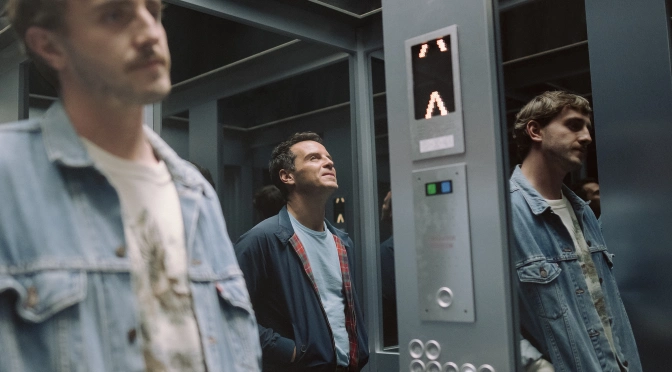The sun seems ready to set at any moment in Leaning on Pete director Andrew Haig’s new film We Are All Strangers, a heartbreakingly personal romance. For a film that tells its story entirely at dusk, the idea of a Shakespearean narrative can be just right. Sure, there’s some implied drama in the film’s premise, which sometimes dances on the periphery of the gimmick. However, Hague’s shockingly raw emotional investment in the narrative offsets these concerns. This isn’t an autobiographical film – the film was inspired by Taichi Yamada’s 1987 novel The Stranger – but it’s full of completely open-hearted passion all the same.
Andrew Scott plays Adam, an extremely lonely writer living in an even lonelier London. He is one of two occupants of a new high-rise building just outside the city, a dilapidated corporate building that is more of a hotel than a home. The other is Harry, a young hedonist played by Paul Mesca, whose only companion at the start of the film is the bottle of whisky in his arms that is rapidly emptying. The building’s empty rooms are filled with absent love. Adam’s parents died in a tragic accident when he was 12; Harry’s parents accepted him but never came to see him. In their shared loneliness, the two find similarities. A tender romance unfolds. The story is warm, uncertain and beautifully plotted.
Working on his latest screenplay – “I’m not a qualified writer. When necessary, I’ll write for film …… and television”-Adam travels to the place where he lived as a child. This is where fantasy stories begin to come into play. In a local park, Adam’s father appears from a distance to guide him home. Adam’s parents are alive and well at home – or at least it seems that way – although the home is exactly as he remembers it from his formative years. The years, months, weeks and days before they died. Claire Foy and Jamie Bell play Adam’s parents, neither of whom are named, except for Dad and Mum. It’s his memory, after all. Haig captures their introductions as if they were old-fashioned home-video snapshots, which he shoots with a 35mm lens that enhances the nostalgic haze. His shots are intimate, familiar and full of warmth.
The camera cools as Hague uncovers the sharp corners of a painful past. The old ideas don’t soften – Adam’s mother fears he’ll contract HIV if he learns of his sexuality – but it becomes a fascinating point of enquiry, with Hague speculating aloud about what an orphaned child might ask his parents if given the chance. It’s an intriguing approach that comes into its own as the mystery unravels. Scott brilliantly captures the nuances of a man struggling between past and present as he becomes increasingly isolated in his mediation. In Harry’s company, Adam’s eyes are filled with misanthropy and glisten with pain. Upon returning to the arms of his parents, these pale eyes widen again and the innocence of childhood is restored. Scott was older than both Foy and Belle, but acted convincingly as a much younger man.
This is truly a stunning story. Haig’s visuals are stunning, Jamie D. Ramsay renders each scene in glorious colour, and his brushstrokes go right to the heart of the human psyche. It’s an emotionally profound story with complex and specific experiences that resonate universally. Even if you’re a lonely gay man in your forties, you’ll understand the longing for the sunset to be delayed a little. Again, there’s an all-too-familiar phrasing to Hague’s ears. One of the best is when Adam’s mother learns of her son’s achievement and exclaims, “If I knew what the neighbours were up to, I’d run over and tell them.” It’s one of the most moving lines in the film.
It is, of course, Hague’s gift as a writer. Yet here, too, it foreshadows how closely We Were All Strangers is linked to Haig’s own life experiences. As the saying goes, practice makes perfect. So I was delighted to learn that such a talented writer explores the complexities of romantic and familial love with an open mind. It’s very personal.
